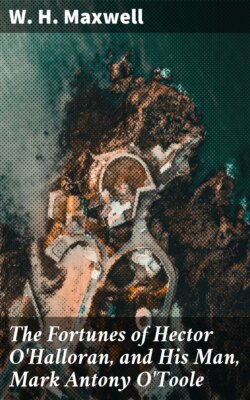Читать книгу The Fortunes of Hector O'Halloran, and His Man, Mark Antony O'Toole - W. H. Maxwell - Страница 23
На сайте Литреса книга снята с продажи.
CHAPTER IX. THE COCK AND PUNCH-BOWL
ОглавлениеTable of Contents
“Rosalind. Here’s a young maid with travel much oppress’d,
And faints for succour.”
“Corin. I pity her,
And wish for her sake, more than for my own,
My fortunes were more able to relieve her.”
As You Like It.
Although I departed from Kilcullen at cockcrow, Mark Antony O’Toole, having borrowed some hours from the night, had taken the road before me. Apprehensive of the desperate lengths to which deserted dairy-maids may be driven, the fosterer moved off without beat of drum; and the better to evade pursuit, had Kitty Dwyer attempted to recover the truant, and “vi et armis” repair her reputation by a sanatory visit to the altar, Mr. O’Toole prudently declined marching by the mail-coach road, and masked his retreat with an ability that puzzled the priest himself. But as it turned out, Mark Antony’s caution was unnecessary. Kitty bore her bereavement like a Christian woman,—hinted that the sea held as good fish as ever had been taken yet,—and, from divers hymeneal overtures, blessed God that she had no grounds for despondency. Aiding and assisting sound philosophy with “rum and true religion,” she got over her disappointment—within a fortnight, the false one was forgotten—Miss Dwyer “open to an offer”—and ready to commit matrimony at sight.
Two days before his evasion from my father’s house, Mark Antony had privately despatched his kit by a Dublin carrier, and the few necessaries required for his journey were formed into a bundle of small dimensions, and suspended from the extremity of a well-tried shillelagh. Dressed in a smart morning suit that erstwhile had called me owner, the fosterer had more than once examined his outer man with evident satisfaction. His step was light, his breast without a care, and his pocket heavier than it had ever been before—he went on his way rejoicing—and when evening began to close, Mark Antony had placed five-and-twenty miles between him and that ill-requited fair one, whose only crime was loving “not wisely but too well.”
Half a century ago Irish engineers, in Yankee parlance, were “reg’lar go-a-heads.” Neither condescending to turn to the right or to the left, they crossed the country “as God had made it,” took the bull by the horns, and scorning to steal round a hill they boldly breasted it. The fosterer had been escalading one of these heights for the last hour, and, on topping its ridge, overtook two wayfarers of opposite sexes who had preceded him in the ascent, and were now resting after its achievement.
Like himself, the travellers were not incommoded with heavy baggage, for what appeared to be their united kit was even smaller than his own, and was comprehended within the compass of a faded silk-handkerchief. The man was stout, undersized, and looked full thirty—the girl seemed scarcely nineteen—and from their dress and general appearance, the fosterer was sorely at a loss to decide to what grade of society the strangers appertained.
The male traveller’s dingy black frock had once seen better days, and his buff vest and nankeen unmentionables would have been all the better for a visit to the laundress. His hat was of that order denominated “shocking bad,” while it seemed doubtful that his boots would bear him to the end of his journey, and if they did, it would be by an expiring effort with which their history must close. His complexion was sallow, his features large, his whiskers black and bushy, he looked a dirty Jew; and certainly, “take him for all in all,” he was not the sort of person whom a gentleman would borrow money to entertain.
In every particular the girl was unlike her companion. She was pretty, tall, fair, and well formed. Her costume—a collection of faded finery—was tolerably clean; and, poverty apart, her air and address were those of one who had once moved in a different sphere, and, to judge by appearances, of one also, upon whom fortune had frowned severely.
On both sides some civilities were interchanged; and to an inquiry from the fosterer as to where entertainment and lodgings could be found, the man pointed out a solitary house at the distance of a mile, intimating that it was a carman’s stage held by travellers in high estimation. It was moreover kept by a buxom widow, and denominated.
